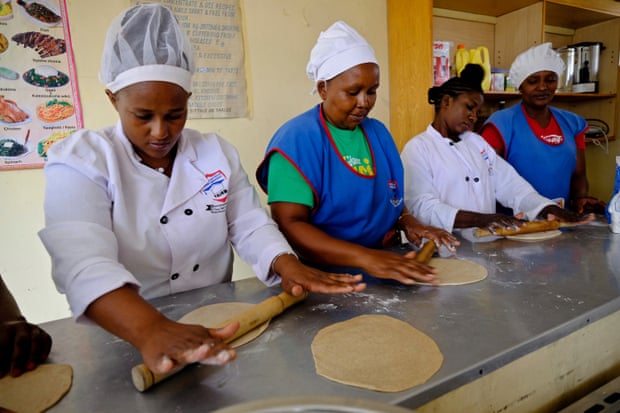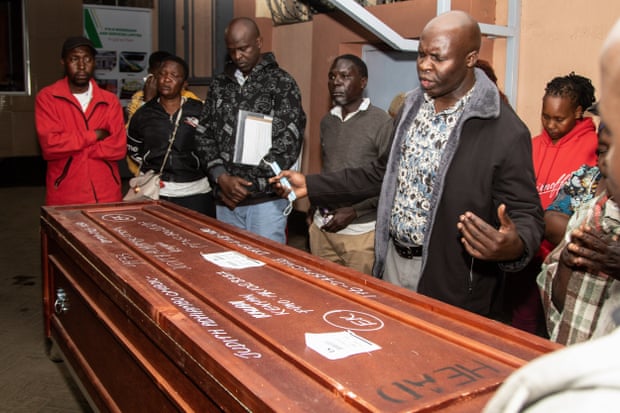Deaths and alleged abuse of Kenyan women in Saudi Arabia fuels demands for Nairobi to act on human rights
Rights groups have expressed concern that not enough has been done to address the alleged mistreatment of domestic workers in Gulf states, such as Saudi Arabia, after the Kenyan government moved to secure work opportunities abroad for its citizens.
“This is a matter of grave public interest,” said John Mwariri, a lawyer at Kituo cha Sheria, a legal aid organisation. “Many of our Kenyan citizens have been abused and are dying there. There is an urgent need for protections.”
While there is no recent, publicly available data on Kenyan migrant worker deaths, the country’s foreign ministry reported that at least 89 Kenyans, most of whom were domestic workers, lost their lives in Saudi Arabia between 2020 and 2021.
Kituo cha Sheria and another rights group, Hakijamii, are supporting litigation against the Kenyan government by nearly a dozen former domestic workers who previously worked in Gulf states, who claim that the government failed to take proper measures to protect them from “modern-day slavery and human trafficking”.
In the case, which was filed in early February, the workers claim the Kenyan government has “neglected” to investigate many cases of deaths and abuse. The government is due to file its response within the next couple of months.
Saudi Arabia is an important source of remittances into Kenya. Migrant workers in the Middle East country reportedly sent roughly £237m to their families in Kenya last year.
Kenya is also grappling with high rates of unemployment, and job creation – locally and internationally – is a “key government agenda”. For Kenya’s President, William Ruto, who came to power promising better opportunities for lower-income Kenyans, the issue may become a yardstick of his administration’s success.

The president’s plans to sign several new bilateral agreements, announced last month, are part of a push to enable more Kenyan workers to find opportunities abroad – in Europe, North America and the Middle East.
Most of the agreements will be with Germany, which has a strong labour law record. But Saudi Arabia’s inclusion on the list has alarmed rights groups, which fear that the harrowing reports from domestic workers in the Gulf country have not been adequately addressed.
In its lawsuit, the organisation called for the “immediate suspension” of all labour migration to the Middle East until the state meets some “basic minimums”, and has demanded damages for the victims or their families.
Purity Mbogo, 33, is one of the workers behind the case. In 2020, she was job-hunting and heard about a teaching role in Qatar but later realised, to her horror, that the recruitment agency had put her up for a housekeeping role in Saudi Arabia, instead.
In her written testimony to the court, seen by the Guardian, Mbogo claims her phone and passport were confiscated upon arrival, leaving her unable to communicate with her family for months. She says she was hit with a hot iron when she complained about the seizure of her phone. She found her way back to Kenya in late 2020, after her family helped her get out of Saudi Arabia.
“I would never return to that country,” Mbogo told the Guardian.
A number of women involved in the case say they faced physical and sexual abuse while working in the Gulf states. One woman claims she had a child as the result of rape by her Saudi Arabian employer. The petitioners claim that the Kenyan embassy in Saudi Arabia “shut [its] doors” to stranded workers when they reported their plight to consulate representatives there, “forcing them to be detained at deportation centres and agency accommodation facilities, where life was demeaning for a human being”.
In March, Kenya’s Ministry of Labour and Social Protection carried out an inquiry into hundreds of recruitment agencies and barred 26 rogue agencies from sending workers abroad, according to local media reports.
Officers from the labour ministry travelled to Saudi Arabia in January on a “fact-finding mission”. While there, they met representatives from the Philippine embassy to discuss “experiences” and “best practices of labour export” to Saudi Arabia.

Rights groups say the Kenyan government should take steps to protect workers from the kafala system – a work-sponsorship system used in many Gulf countries including Saudi Arabia, which gives employers enormous control over workers’ immigration and employment status.
Under the system, workers need to get their employer’s consent to end their employment, transfer jobs or exit the country, which leaves those facing abuse vulnerable to exploitation. Those who end up in the hidden economy, a Kenyan foreign ministry official said, fall prey to brokers who traffic them to work in other households illegally.
Kenya’s Ministry of Foreign & Diaspora Affairs has said some measures to help and protect foreign workers were not known or were underutilised, pointing to the “holding centres” in Riyadh, which provide accommodation for female domestic workers in distress.
According to the diaspora office, these centres have taken in roughly 8,000 women over the past two years, offering legal aid for employment disputes, providing food and psychological care, and assisting them to procure visas and flights home. However, some of the centres have also been accused of mistreating migrant workers and detaining them in squalid conditions for months.
Kenya’s labour ministry did not respond to requests for comment.
